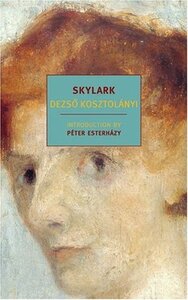Take a photo of a barcode or cover
dark
emotional
reflective
slow-paced
Plot or Character Driven:
A mix
Strong character development:
Yes
Loveable characters:
Yes
Diverse cast of characters:
No
Flaws of characters a main focus:
Yes
This is an utterly beautiful book. The writing is stunning, at times simple but always clever and perfectly assembled, and each of the characters were gorgeous in their own tragic ways. A premise such as this, where the daughter leaves home, usually produces a book about her and of her own coming of age story, which is what I was expecting. However, Skylark herself is scarcely in this novel and yet she is, in the minds of her parents who simultaneously miss her and don't. The themes of this are sombre and yet there is a lot of lightness and humour to it as well, which Kosztolanyi balances masterfully. Some will find the ending abrupt and purposeless, almost as though the book could have carried on for another hundred or so pages, but I loved that about Skylark. This story doesn't really have a resolution, nothing is really mended come the final sentences, but I feel this is genius. It isn't out of laziness that Kosztolanyi did this. There was purpose behind it and that is tangible in every word, making it a poignant book.
inspiring
reflective
medium-paced
emotional
hopeful
inspiring
lighthearted
reflective
medium-paced
Strong character development:
Yes
Loveable characters:
Yes
Diverse cast of characters:
No
Flaws of characters a main focus:
Complicated
Serendipity supplied this book to me, it was a fun but unusual read. Nicely written and translated about an elderly couple coming to terms with a mature daughter "Skylark" who takes a one week holiday for the majority on the novel throwing the equilibrium og life out of whack for the parents and Skylatrk herself.
There are lot of things we can think and feel about it , but expressing it or discussing about it will be the most difficult thing. This results in everyone wearing a mask and leading a Doll life. Nice work by the author.
I'm not really sure who the contemporary audience is for this 1920s Hungarian novel about a week in late 1899 in the provincial town of Sárszeg(a fictional version of present-day Subotica, now in Serbia) -- but it's an oddly compelling book. The basics of it are very straightforward -- retired 60-year-old archivist ÁkosVajkay and his wife live in a modest house with their 35-year-old unmarried daughter. Their daily routine is essentially a drab purgatory of domestic routine and exactly zero pleasures. When their daughter (the title character) goes off to the country for a week for the first time in years, what will happen?
The metamorphosis from decaying, isolated, misanthropic, homebodies to a theater-going, restaurant-dining, socializing couple is a joyful transformation. A good part of the wonder comes from the vast array of personalities that populate the town, and how it becomes apparent that the parents did at one point have a broad social circle and life. Kostolanyi grew up in Subotica, and one has to believe that he drew upon real places and people for much of what he describes. It all comes to a crescendo with an epic Thursday night debauch of liquor, cards, cigars, and fellowship. All of which makes the concealment and reversion to isolation especially heartbreaking when the daughter returns the next evening.
I'm sure those with a fine sense of central-European history could draw a lot more from the book. For example, it can't be an accident that a book written after the devastation of World War I is set in the final months of the previous century. Similarly, the father's profession was bound up in genealogy and heraldry of great families, all of which would come to mean precisely nothing in the modern world the author lived in. The book would also be interesting to view through a feminist lens -- although the father's name is used repeatedly, the mother's name is mentioned just once or twice and otherwise she is "Mother." There's a bit to be unpacked about daughter's physical ugliness and spinsterhood, and how that plays into the family dynamics. On the whole a very melancholy and elegiac read.
The metamorphosis from decaying, isolated, misanthropic, homebodies to a theater-going, restaurant-dining, socializing couple is a joyful transformation. A good part of the wonder comes from the vast array of personalities that populate the town, and how it becomes apparent that the parents did at one point have a broad social circle and life. Kostolanyi grew up in Subotica, and one has to believe that he drew upon real places and people for much of what he describes. It all comes to a crescendo with an epic Thursday night debauch of liquor, cards, cigars, and fellowship. All of which makes the concealment and reversion to isolation especially heartbreaking when the daughter returns the next evening.
I'm sure those with a fine sense of central-European history could draw a lot more from the book. For example, it can't be an accident that a book written after the devastation of World War I is set in the final months of the previous century. Similarly, the father's profession was bound up in genealogy and heraldry of great families, all of which would come to mean precisely nothing in the modern world the author lived in. The book would also be interesting to view through a feminist lens -- although the father's name is used repeatedly, the mother's name is mentioned just once or twice and otherwise she is "Mother." There's a bit to be unpacked about daughter's physical ugliness and spinsterhood, and how that plays into the family dynamics. On the whole a very melancholy and elegiac read.




